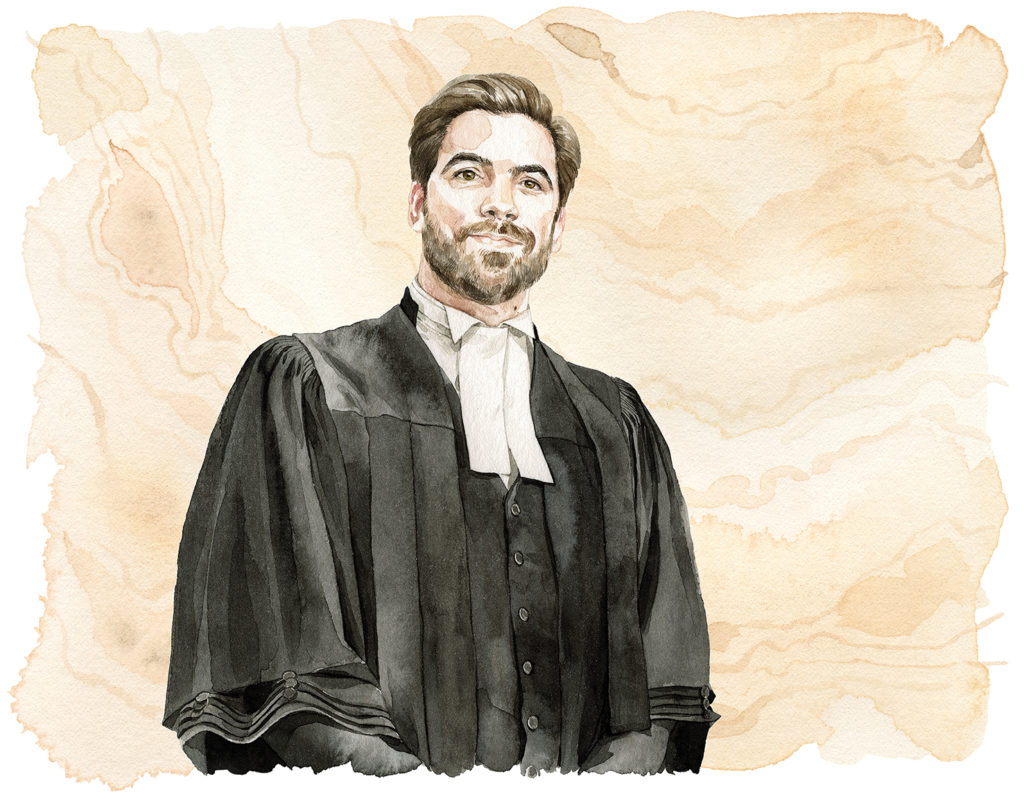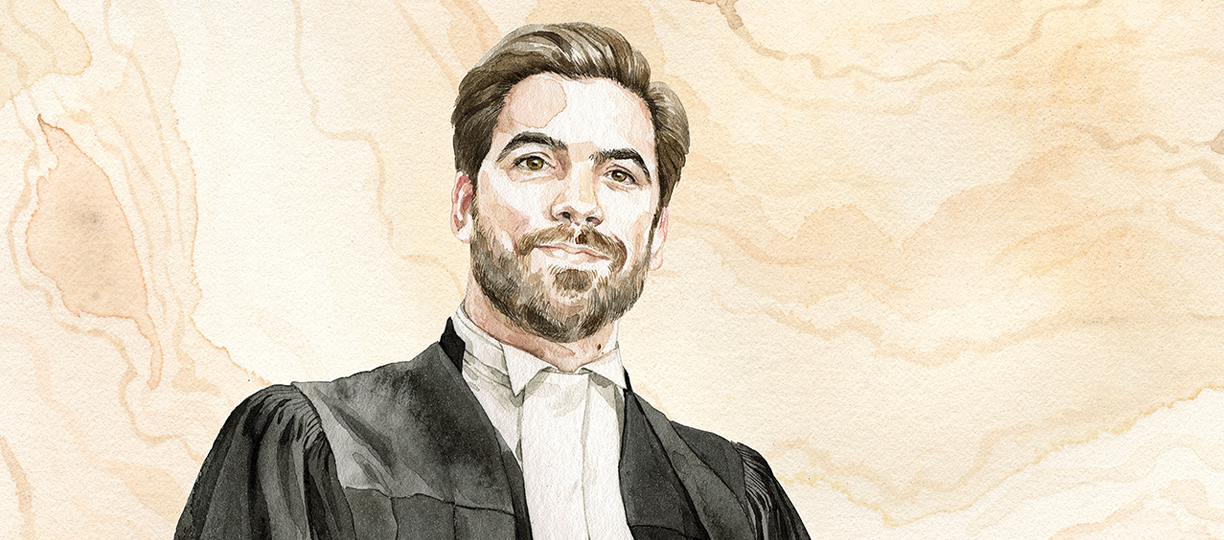Whenever the public debates a vital topic in criminal justice — the lack of funding to legal aid, the over-incarceration of racialized people, the psychological toll of difficult casework — one actor in the system is typically absent: the Crown. “I don’t know if it’s because we don’t get asked enough or we’re just not willing to volunteer,” says David Quayat, a 44-year-old prosecutor in Brampton. “I’m not sure what the culprit is.”
No matter where the blame lies, Quayat is ready to talk candidly about his job. By speaking out, he hopes in part to correct long-standing misconceptions about the prosecution service. He objects, for instance, to the popular narrative that casts defence counsel in a David-vs.-Goliath battle against the limitless powers of the state. “I would agree that the defence bar, as a general proposition, is under-resourced,” he says. But prosecutors live under constraints too, he insists, even if they aren’t as acute as those in criminal defence. “The idea that there is an infinite number of resources to be brought to bear against a particular accused is just inaccurate.”
Quayat is an unlikely figure to initiate a public conversation from the perspective of a Crown. Back in 2015, as a seventh-year lawyer, he landed what seemed like his ideal role: defence counsel at Edward H. Royle & Associates (now called Edward H. Royle & Partners LLP). By that point in his career, he’d worked in trade law and civil litigation, but he craved more time in court. As a defence lawyer, he conducted trials on a near-constant basis. He loved it.

David Quayat
Federal Crown counsel, Public Prosecution Service of Canada
Year of call: 2009
Then Quayat had a son. “That was itself a complicating variable,” he says. “It’s not a secret: I wasn’t in any meaningful relationship with my son’s mother. It was a completely unexpected thing.” All of a sudden, his work schedule — which might take him to court in Barrie one week, then to Hamilton the next — made it “very difficult” to be a part of his son’s life.
By 2017, he had joined the federal Crown’s off ice. He remained a busy courtroom lawyer, but he enjoyed less travel, a higher salary, a good benefits package and a pension. As a new parent, he says, “it made all the sense in the world.”
When Quayat became a prosecutor, James Miglin, a criminal-defence lawyer at Edward H. Royle, knew that his colleague would bring integrity and a “sense of fairness” to the position. “We need good Crowns,” says Miglin. “That’s essential to the proper functioning of the criminal-justice system.”
In his first few years as a prosecutor, Quayat took on two additional jobs. First, he became an instructor of international law at the University of Toronto. (He teaches the course on Monday evenings.) Second, he joined the armed forces as a reserve legal officer. “The work ebbs and flows,” he says. He might be called on, for instance, to brief commanders on updates to military law. Because he’s a federal public servant, it’s relatively simple to book off time as a prosecutor to advise the military. “It’s been a great experience.”
He spends the bulk of his working life, however, as a federal Crown. And, today, he’s happy to provide a sight line into the world of the prosecution service.
“One thing I wish people knew more of,” he says, “is just how much work goes on behind the scenes in evaluating our cases.” Before proceeding with a charge, he has to consider, for instance, his department’s resources and what to prioritize in the face of a chronically backlogged court calendar. Those decisions can be “agonizing.”
The behaviour of law enforcement is also a persistent preoccupation. “Most police officers are very good people, but some are not,” he says. “Like any institution staffed by humans, there are going to be people who don’t deserve to or ought not to be there.” Part of his job is to identify instances of misconduct. “Not a week goes by as a prosecutor where I am not questioning, interrogating or examining the conduct of police officers to ensure that it is above board and that it’s compliant with our constitutional norms.”
Quayat also wants the public to understand that prosecutors appreciate, deeply, what it means to ask the court to convict and imprison another human being. To illustrate that point, he describes how he’s handled about 15 “courier-import cases,” in which someone has tried to smuggle drugs (say, two kilograms of cocaine) into the country through the airport. That’s a crime, and he works hard to secure a conviction. But he also knows that the defendants are often racialized, poor or otherwise disadvantaged, not “the mastermind of a criminal organization.” After the court places such a person into custody following a conviction or sentencing hearing, Quayat has an emotional reaction: “When I leave the courthouse or the courtroom, I usually have to find a private place, and I sometimes cry.”
Such stories, he thinks, are important to share. “We need to, as Crowns, be a little bit more open to talking and to expressing our feelings,” he says. “In a universe where you have Twitter and TikTok, we can’t not be part of the conversation.”
Timeline of a prosecutor
2005: Quayat starts law school at the University of Ottawa.
2006: He summers at the Department of Foreign Affairs, where he spends most of his time on the Canada-U.S. softwood lumber dispute.
2007: He summers at McCarthy Tétrault LLP in Calgary.
2008: He clerks at the Federal Court under Chief Justice Allan Lutfy. “He was an amazing boss,” says Quayat. “I always felt heard.”
2009: Quayat moves to Washington, D.C., to join White & Case LLP as an associate in the trade group.
2011: He joins Lenczner Slaght LLP in Toronto. He learns a lot and has great colleagues, but he appears in court less often than he’d like.
“There are fewer and fewer civil trials,” he says. “I didn’t feel like a real litigator at times.”
2015: He becomes a defence lawyer at what was then called Edward H. Royle & Associates.
2017: Quayat takes a job at the federal Crown’s office in Brampton. He handles a wide range of files, including drug, terrorism and organized-crime cases.
2018: He starts to teach international law to political science students at the University of Toronto.
2019: He joins the Canadian Armed Forces as a reserve legal officer. Looking back, he feels fortunate to have stumbled into such a wide-ranging career: “The best part about being a lawyer is sometimes being open to the wind.”
This story is from our Fall 2022 Issue.
Illustration by Melinda Josie.


